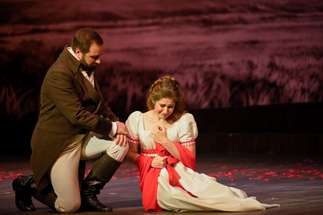|
Back
Duo Captivates at Opéra de Montréal Montreal
Salle Wilfrid-Pelletier, Place des Arts
09/14/2019 - & September 17, 19, 22, 2019
Piotr Ilyich Tchaikovsky: Eugene Onegin, Opus 24
Etienne Dupuis (Onegin), Nicole Car (Tatyana), Carolyn Sproule (Olga), Owen McCausland (Lensky), Stefania Toczyska (Filipyevna), Christianne Bélanger (Larina), Denis Sedov (Gremin), Spencer Britten (Triquet), Jean-Philippe Mc Clish (Captain), Brendon Friesen (Zaretsky)
Chœur de L’Opéra de Montréal, Claude Webster (Chorus Master), Orchestre Métropolitain, Guillaume Tourniaire (Conductor)
Tomer Zvulun (Director), Erhard Rom (Sets), Isabella Bywater (Costumes), Claude Accolas (Lighting)

E. Dupuis, N. Car (© Yves Renaud)
Opéra de Montréal (OdM) launched its 29th season with a sumptuous production of Eugene Onegin, jointly owned by five U. S. opera companies.* Conducted by Frenchman Guillaume Tourniaire and directed by Israeli Tomer Zvulun, the action progressed at a steady, but at times uneven, pace during the first half, picked up during the second, then suddenly soared to the stratosphere in a riveting final scene with the real-life couple Nicole Car (Tatyana) and Etienne Dupuis (Onegin). The unexpected intensity of the conclusion drove the audience to a frenzy. I saw the Australian Car and French-Canadian Dupuis last winter in Gounod’s Faust and Verdi’s La Traviata in Marseille. That city’s smaller house (about 1800 seats) allowed the audience greater intimacy with the couple. In Montreal, however, some of Car’s lower notes couldn’t be heard over the full orchestra in Montreal’s cavernous Salle Wilfrid-Pelletier (nearly 3000 seats). Dupuis’ voice has developed more richness and depth in recent years and Car’s bright voice has a versatility and range that could serve her well in both soprano and mezzo roles.
Canada’s Owen McCausland (Lensky), who delivered his heroic aria “Kuda, kuda, kuda vi udalilis” with power, passion and panache, was another highlight of the evening. Carolyn Sproule (Olga) performed with animation and vigor, and her deep, dusky mezzo seemed to stand apart from the lighter female voices. Christianne Bélanger (Larina) sang with conviction and style. Stefania Toczyska (the nanny Filipyevna) sang well but could have been more animated; she seemed to be more of a servant than part of the family. Denis Sedov’s (Gremin) voice had power and depth but sounded gravelly and ragged. The young tenor Spencer Britten (one of three members of the OdM’s highly successful training school, Atelier lyrique, in this production) gave a felicitous turn as Monsieur Triquet while pulling off a few magical tricks to delight the ball’s attendees as well as the audience.
Set designer Erhard Rom employed a second, upstage proscenium to anchor the action. Its curtain, which stretched across the stage, opened and closed according to the scene, and gliding walls from the sides of the stage changed the configuration from a square to a rectangle according to the desired intimate or public setting, as needed. The tasteful sets’ colors in muted greens and grays, the monumental Corinthian columns and chandelier for the ball scene, the rich period costumes by Isabella Bywater, and the subtle, judicious lighting by Claude Accolas all contributed to this glittering production.
The Orchestre Métropolitain performed with passion, clarity and verve but at times could have used more heft. The large, animated Chœur de l’Opéra de Montréal (prepared by Claude Webster) was in fine form, although at times lacked confidence in the dance sequences.
*Lyric Opera of Kansas City, Hawaii Opera Theatre, Michigan Opera Theatre, Atlanta Opera and Seattle Opera
Earl Arthur Love
|